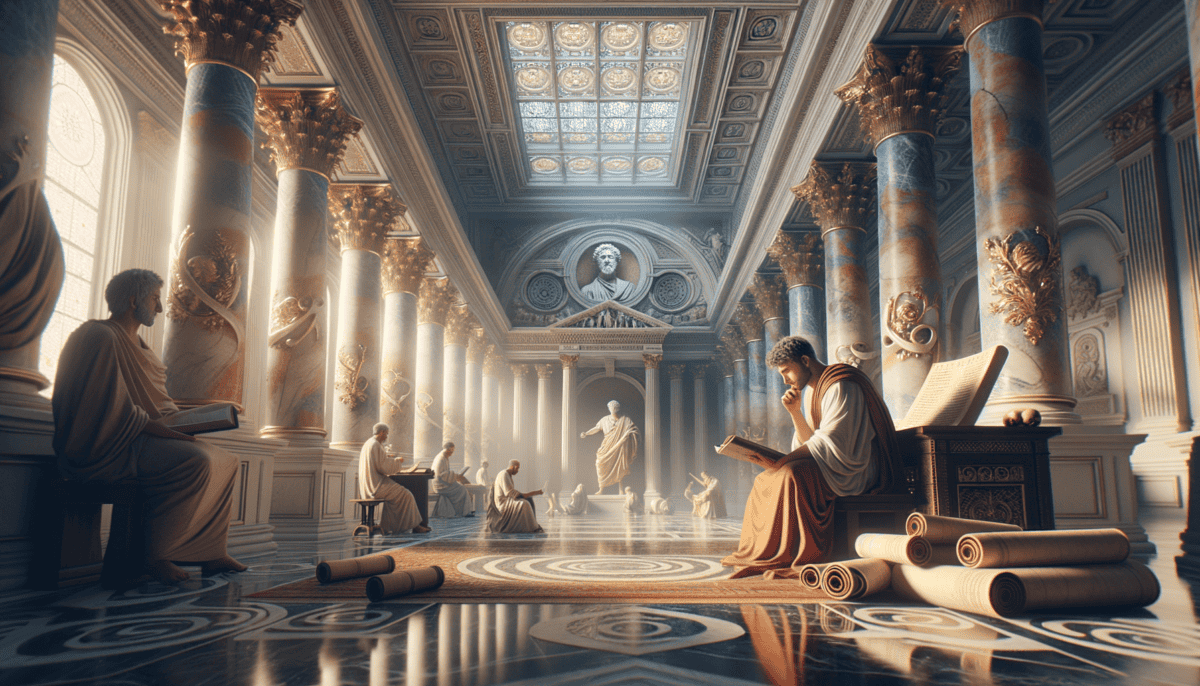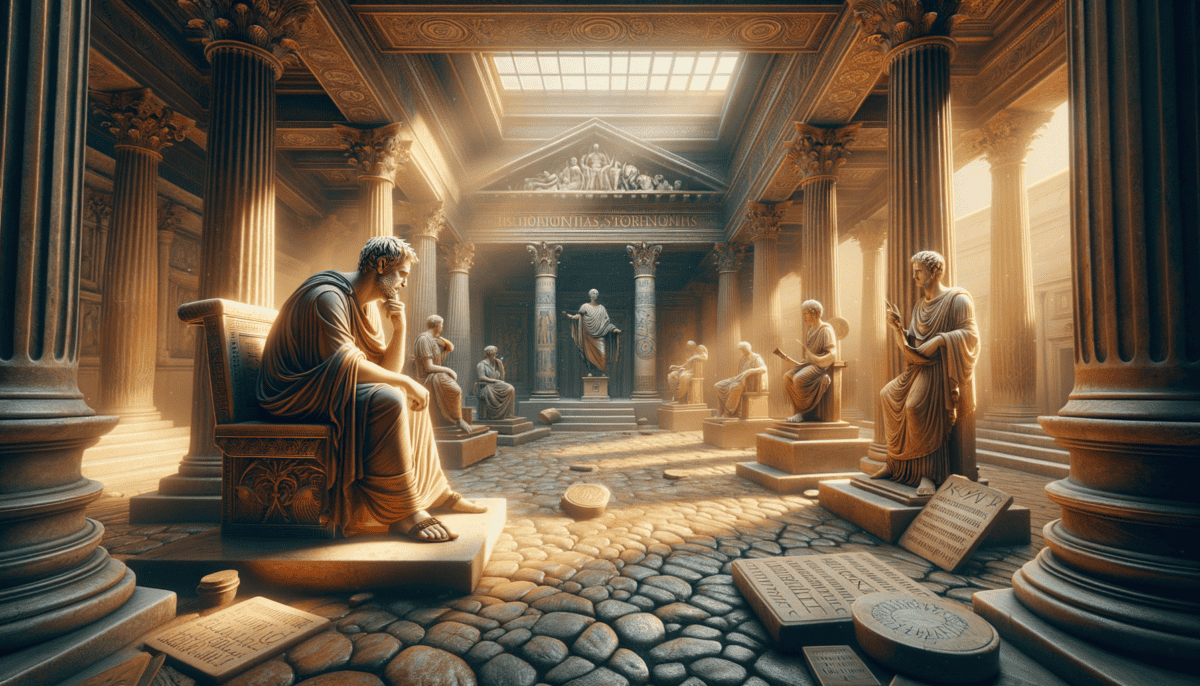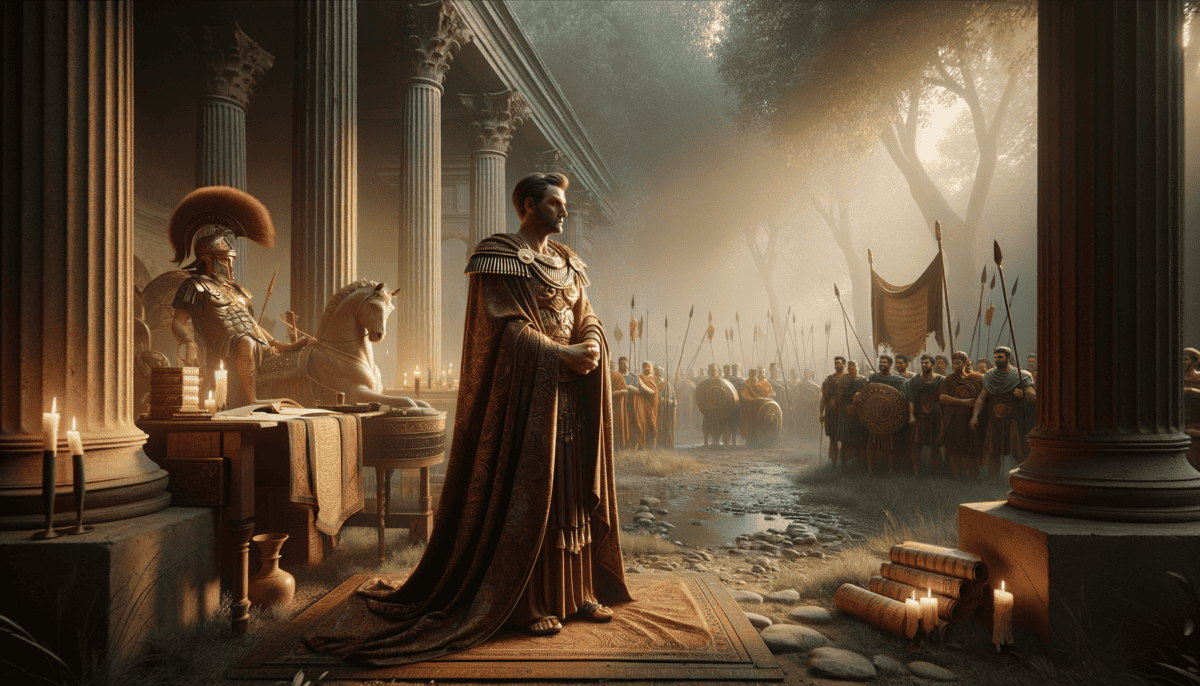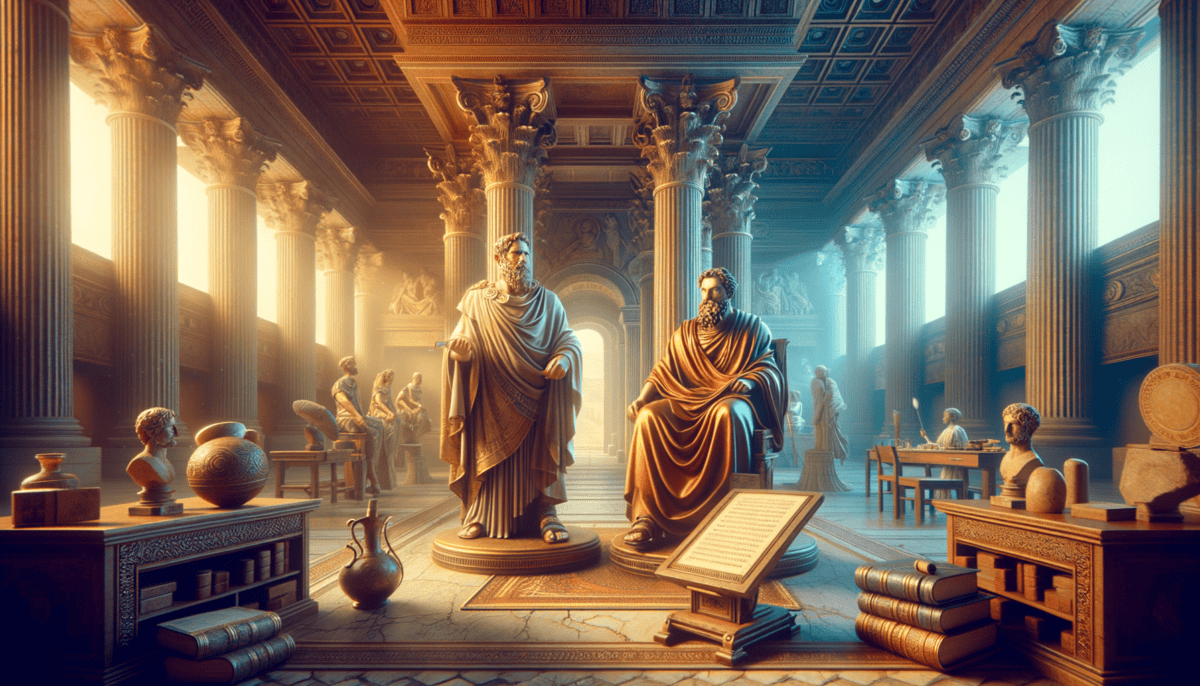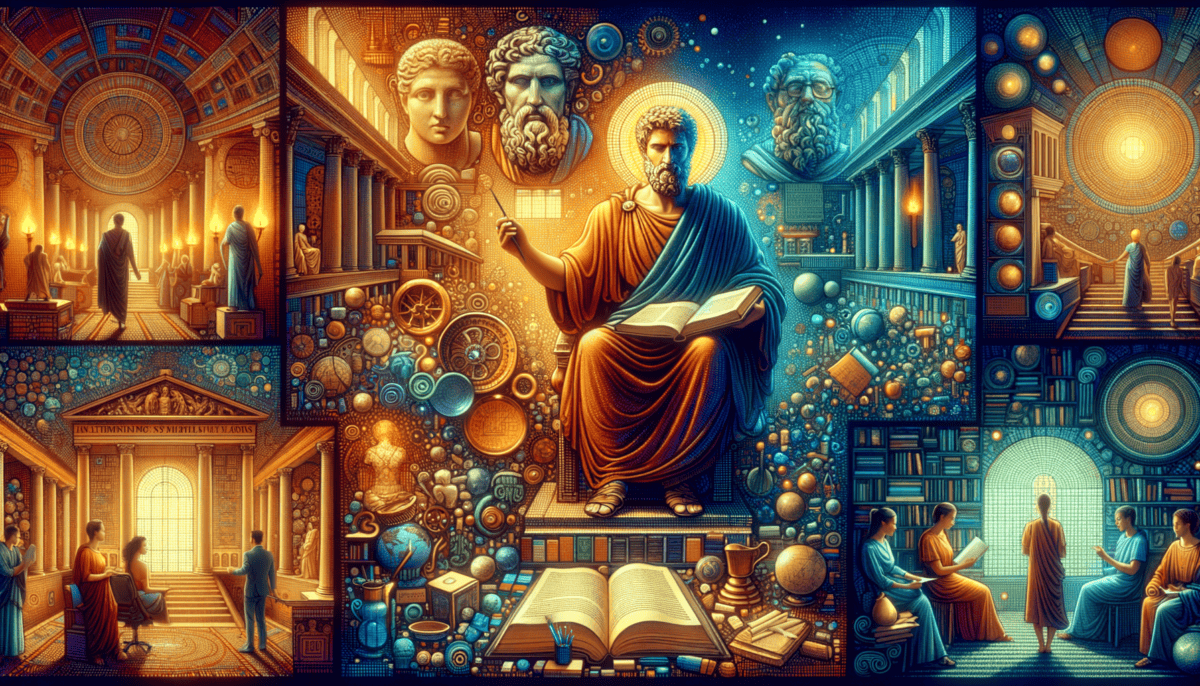Chains of Destiny
The sun was hot in ancient Rome. A young boy named Epictetus limped through the dusty streets. His leg hurt, but he kept walking. He was a slave, and he had work to do. ️
"Move faster, boy!" shouted his master.
Little Epictetus tried not to cry. His master was not kind. But something special was about to happen that would change everything.
“We cannot always choose what happens to us,” Epictetus would later say. “But we can choose how we feel about it.”
One day, while cleaning his master's house, Epictetus heard voices coming from a room. He peeked inside. There were men sitting in a circle, talking about big ideas. They were philosophers!
A Spark of Hope
The philosophers talked about something called "Stoicism." They said that being good and wise was more important than being rich or powerful. Epictetus listened carefully. His eyes got wide with wonder.
"Even a slave can be wise and good," one philosopher said. These words made Epictetus's heart jump!
Every day after that, Epictetus would sneak peeks at the philosophy lessons. He learned new words. He learned new ideas. Most importantly, he learned that his mind was free, even if his body wasn't.
The Kind Teacher
One of the philosophers noticed young Epictetus. His name was Musonius Rufus. He saw how eager the boy was to learn.
"Come closer," Musonius said kindly. "You may listen too."
Epictetus couldn't believe his luck! From that day on, he studied whenever he could. He learned that:
- Being good is more important than being powerful
- We should be brave when things are hard
- Wisdom makes us truly free
A New Beginning
Years passed. Epictetus grew stronger in his mind, even though his leg stayed weak. He learned that true strength comes from inside.
His master saw how smart he was becoming. Sometimes, he let Epictetus spend more time learning instead of working.
"Knowledge cannot be chained," Epictetus would say to himself. He smiled as he wrote his thoughts on a wax tablet. ️
Even when his work was hard, Epictetus stayed calm. He remembered what the philosophers taught him. He couldn't change being a slave, but he could change how he thought about it.
Young Epictetus didn't know it yet, but his love for wisdom would take him far. One day, he would become one of the most famous teachers in all of Rome. But for now, he was just a boy with a dream, learning to be brave and wise.
As the sun set over Rome's great buildings, Epictetus looked at the stars. He might have been a slave, but his mind could fly as high as those twinkling lights. Tomorrow would bring new lessons, new wisdom, and new hope.
| What Epictetus Learned | Why It Matters |
|---|---|
| Be brave | Helps us face hard times |
| Stay calm | Makes us stronger inside |
| Keep learning | Makes our minds free |
The night grew quiet in ancient Rome. But in one small room, a young slave's mind was buzzing with big ideas. His journey was just beginning.
The Emperor’s Path
In a grand house in Rome, a young boy named Marcus sat reading. He wasn’t just any boy – he would one day be Emperor! But right now, he was learning about being good and wise.
A Special Student
“Marcus, are you ready for your lessons?” called his teacher, Fronto.
Marcus jumped up excited. He loved to learn! His room was full of scrolls and books. Even though he lived in a fancy house, Marcus liked simple things.
Learning to Lead
“Being a good leader means being a good person first,” Fronto told Marcus. The boy nodded, writing it down on his tablet.
Marcus had many teachers. They taught him about:
- Being kind to others
- Thinking before acting
- Doing what’s right, even when it’s hard
“A leader must have a heart of gold and a mind of steel,” Fronto would say.
The Big Surprise
One day, Emperor Hadrian visited Marcus’s house. He watched the boy study and play.
“This boy,” Hadrian said, “will be Rome’s next emperor!”
Marcus was shocked! He didn’t jump up and down or shout. Instead, he thought about all the people he would need to help.
Growing Wisdom
As Marcus grew older, he studied harder. He learned from wise teachers called Stoics. They taught him to:
Stay calm when things go wrong
Help others before helping himself
Think carefully before making choices
| What Marcus Learned | How He Used It |
|---|---|
| Be patient | Listen to everyone’s problems |
| Stay humble | Live simply, even as prince |
| Work hard | Study and practice every day |
Tests and Trials
Sometimes being a future emperor was hard. Marcus had to:
Wake up very early
Study many subjects
Learn to make big decisions
But Marcus didn’t complain. He remembered what his teachers said: “Every challenge makes us stronger.”
Special Moment: Marcus started writing down his thoughts every night. These writings would later become a famous book!
A Different Kind of Prince
Other young nobles liked to play games and have fun all day. But Marcus was different. He wore simple clothes and worked hard.
“Why don’t you live like a prince?” his friends asked.
“I want to be worthy of leading Rome,” Marcus would answer. “That means learning to serve others.”
Dreams and Duties
At night, Marcus would look at the stars from his window. He thought about the big job ahead. Being emperor would be hard, but his teachers were helping him get ready.
He wrote in his diary: “Each day, try to be a little bit better than yesterday.” ⭐
Young Marcus didn’t know all the challenges waiting for him. But his love of wisdom and desire to help others would make him one of Rome’s greatest leaders.
As he grew, the boy who loved books would become the man who would lead Rome with wisdom and care. His journey was just beginning, and there was still so much to learn.
The School of Resilience
The sun rose over Rome as Epictetus opened the doors to his new school. Once a slave, he now stood tall as a teacher. His simple brown robe fluttered in the morning breeze.
A Dream Come True
“Welcome, students!” Epictetus called out with a warm smile. Young people from all over Rome came to learn from him.
Teaching with Stories
Epictetus had a special way of teaching. He used fun stories to help people learn:
“Think of life like a play,” he would say. “We can’t always choose our part, but we can choose how well we play it!”
His students loved how he made hard ideas easy to understand:
- Be brave when things are scary
- Be kind when others are mean
- Be happy with what you have
Daily Lessons
“Control what you can, accept what you can’t”
“Help others whenever you can”
“Learn something new every day”
A Special Student
One day, a boy named Rufus came to school feeling sad. “I lost my favorite toy,” he said.
Epictetus smiled kindly. “Let’s learn something from this. What can we control?”
“I can be more careful next time,” Rufus answered.
“That’s right! And what can’t we control?”
“What already happened,” Rufus said, starting to smile.
| What We Can Control | What We Can’t Control |
|---|---|
| Our actions | Other people |
| Our words | The weather |
| Our attitudes | The past |
Growing Famous
More and more people came to learn from Epictetus. Even important Romans visited his school! But he stayed humble:
Wise Words: “True happiness comes from inside, not from what we own.”
Fun Ways to Learn
Epictetus made learning fun. He would:
Act out stories
️ Have students debate ideas
Draw pictures to explain things
Big Ideas Made Simple
“Life is like a garden,” he taught. “We can’t control the weather, but we can choose what we plant and how we care for it.”
His students wrote down his words and shared them with others. Soon, people all over Rome talked about the wise teacher who used to be a slave.
A New Kind of Freedom
Epictetus often told his students: “I may have been born a slave, but my mind was always free.” He showed them that true freedom comes from understanding yourself.
Every evening, as the sun set over his school, Epictetus would smile. He had found his purpose – helping others find wisdom and strength within themselves.
As his school grew, so did his message of hope and inner strength. People learned that anyone, no matter where they came from, could live a good and wise life.
Empire and Inner Struggle
Marcus Aurelius sat in his tent late at night. The oil lamp flickered as he wrote in his diary. Outside, soldiers marched through the cold. Being emperor was hard work!
A Leader’s Day
“Dear diary,” Marcus wrote, “today I had to make many big choices. But I remember what my teachers taught me about staying calm.” ✍️
Fighting Bad Guys
The Roman army was fighting mean people who wanted to hurt Rome. But Marcus didn’t like war. He tried to be kind, even to enemies.
“The best way to beat a mean person is to not become mean yourself,” Marcus would say.
Special Words for Tough Times
“Be like a rock when waves hit it”
“Stay strong when things are hard”
❤️ “Be nice even when others aren’t”
A Funny Story
One day, a soldier came running to Marcus. “Emperor! A bear ate my lunch!”
Instead of getting mad, Marcus smiled. “Well, I guess the bear was hungry too. Here, share my lunch.”
Writing at Night
Every night, Marcus wrote about his day:
- Things he learned
- Ways to be better
- Thank you notes to friends
Missing Home
Marcus missed his family back in Rome. But he knew he had to protect his people. He wrote:
| Things I Miss | Things I’m Thankful For |
|---|---|
| My comfy bed | Brave soldiers |
| Playing with kids | Good friends |
| Rome’s gardens | Helping others |
Being a Good Leader
Marcus worked hard to be a good emperor:
He helped poor people
He listened to everyone
He studied to get smarter
Important Rule: “A leader should be kind and wise.”
Special Friends
Even though he was emperor, Marcus had good friends who told him the truth. They helped him make good choices.
“True friends make us better people,” he wrote in his diary.
Night Thoughts
As the moon rose high, Marcus finished writing. He thought about all the people in Rome sleeping safely because he was keeping them safe.
“Tomorrow is a new day,” he whispered. “I will try to be even better than today.”
The emperor blew out his lamp and went to sleep, ready to face another day of being both a strong leader and a good person.
Lessons of Acceptance
Let’s learn about two wise men who taught the same thing in different ways!
Two Teachers, One Message
Epictetus, who used to be a slave, and Marcus, who was an emperor, both had something important to tell us: “We can’t control everything, but we can control how we think about things!”
The Cookie Story
Epictetus liked to tell this story:
“If someone takes your cookie, you can be mad ALL day… OR you can say ‘Oh well, I can still have fun without a cookie!'”
Marcus’s Garden Lesson
Marcus wrote about his garden:
Things We Can Control
They taught that we CAN control:
• How we act
• What we think
• How kind we are
• How hard we try
Fun Ways to Practice
Here’s how they taught people to be happy:
| When This Happens | Try This! |
|---|---|
| It’s raining outside | Read a fun book inside! |
| Someone is mean | Be extra nice! |
| You make a mistake | Learn from it! |
The Happy Game
Both teachers liked to play a game. When something bad happened, they would ask:
“Can I fix this?”
If yes – Try to fix it!
If no – Don’t worry about it!
Special Words
Epictetus said: “Life is like a play – just do your part well!”
Marcus said: “Each morning is a new chance to be good!”
The Weather Lesson
They taught that life is like weather:
☔ We can’t control if it rains
But we can bring an umbrella
☀️ And we can smile anyway!
Being Like a River
Marcus liked to say: “Be like a river – when you hit a rock, flow around it!”
Epictetus would add: “And stay clean and clear inside, no matter what!”
The Best Medicine
Both teachers knew a secret: Helping others makes us feel better! They taught:
Nighttime Thoughts
Every night, they taught people to ask:
✨ “What good did I do today?”
“What could I do better tomorrow?”
“What am I thankful for?”
As the sun set over Rome, their students would smile, knowing they were learning to be happier, no matter what happened.
A Legacy Unbroken
The wisdom of our two friends, Marcus and Epictetus, still helps people today! Let’s see how their ideas make the world better.
Ideas That Never Get Old
Marcus and Epictetus taught us something amazing – how to be happy even when things are hard. Their ideas are like treasure that keeps helping people!
Modern Day Heroes
Today, lots of people use their ideas:
“When I’m nervous about a test, I remember what Epictetus said – just do your best!” – Sarah, age 8
The Happiness Tool Box
These are the tools they gave us to use every day:
• Be kind to yourself and others
• Try your best
• Don’t worry about things you can’t change
• Help people when you can
The Garden Grows
Their ideas are like seeds that keep growing:
| Old Ideas | How We Use Them Now |
|---|---|
| Be brave | Standing up to bullies |
| Stay calm | Taking deep breaths when mad |
| Help others | Sharing with friends |
The Magic Mirror
Today’s Heroes
People everywhere use their ideas:
Teachers help kids be brave
Doctors stay calm when helping people ⚕️
Athletes try their best in games ♀️
The Forever Story
Their story never ends because:
Good ideas keep growing
Kind hearts keep glowing
Brave spirits keep going
The Big Picture
Marcus and Epictetus taught us that:
Everyone can be wise
Everyone can be strong
Everyone can be good
Your Turn!
• Be kind like Marcus
• Be strong like Epictetus
• Be the best YOU! ⭐
The Journey Continues
Every time we try to be brave, kind, or wise, we’re keeping their ideas alive! Their story lives in everyone who:
Stays calm when upset
Tries their very best
And so, the wisdom of Marcus and Epictetus continues to shine, lighting the way for new friends to learn and grow. Their story isn’t just history – it’s happening right now, with you!


